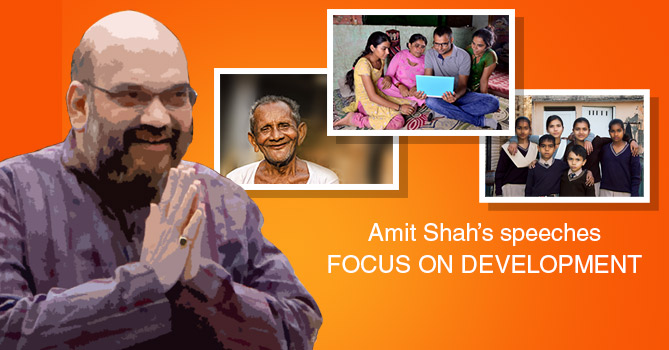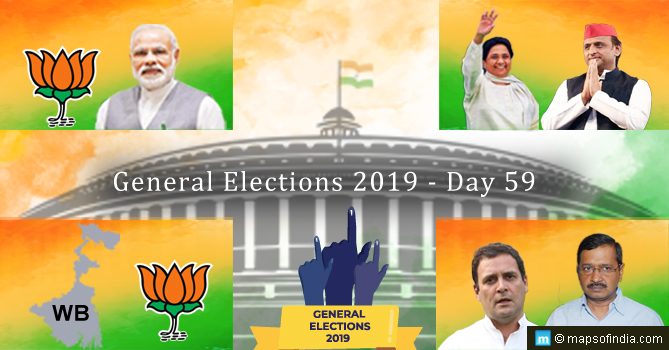Returning soon after Dussehra holidays, BJP President Amit Shah got into rally mood with renewed vigor, calling for the ‘development’ of Bihar as top priority. His speeches had a marked focus on development and targeted women and youth.
Coming in wake of a series of controversies that the BJP has been hit with, it has rightly chosen to focus on development rather than be too loud in their attack of the opposition. He, however, did mention Lalu Prasad’s speech where he called the election a fight between ‘agda’ and ‘pichda’ – forward and backward classes, at Raghopur when he was campaigning for his son. The same speech brought EC’s attention and trouble for him.
Amit Shah spoke of the need for the people of Bihar to come forward, especially the women and youth, and together contribute in making Bihar a developed state. He said his party was ready to do whatever it takes and remains committed to Bihar’s development.
Shah also spoke about how the Dalits and other backward classes had suffered during Lalu’s Jungle Raj and said it was now time for them to be part of the mainstream. The renewed thrust of Shah’s speech in favour of the Dalits, EBCs and OBCs underscores BJP’s attempt to position itself as the new champion of the backward classes, in a move to simultaneously blunt the JD(U)-RJD edge in that segment, along with entering into BSP’s turf, in a calculated step with an eye on elections in U.P in 2017.
Where is the RSS?
2014 Lok Sabha elections marked the resurgence of the RSS, after decades of staying in the shadows, with a resounding victory for the BJP and the emergence of Narendra Modi as the Prime Minister. It was RSS that galvanized its cadres across India who worked tirelessly in the months leading up to the Lok Sabha elections to ensure BJP’s message reached all sections.
Along with BJP, RSS emerged as a big gainer. In the last 17 months, there has been a renewed interest amongst the youth in the RSS ideology and there has been a significant increase in its membership in areas where it had minimal presence. RSS has been struggling to attract new members for years and its existing members were mostly ageing, but post 2014, the youth have been joining the organization in droves and giving it a new thrust.
In Bihar, it was the RSS that worked overtime in getting BJP the magical number of 22 out of 30 Lok Sabha seats. That was no mean achievement and a large part of the credit could well go to the tireless RSS cadres. However, in the current campaigning, RSS has barely been seen. While the cadres have participated in low profile campaigning to some extent, it has been mostly restricted to BJP candidates only. Missing is the organizational thrust and excitement seen last year and the RSS presence has been low key, at best.
It is rather obvious that the relationship between the BJP and its mentor organization the RSS, has cooled down in the backdrop of recent controversies. The contradiction in the relationship between the RSS and BJP lies in the fact that BJP owes its core ideology to RSS but its existence and popularity as a national party lies its centrist approach where it carries all segments of society with a balanced economic agenda. The core of RSS has traditionally come from the upper castes, with Brahmins dominating the Hindutva agenda. This is the reason why the RSS has been against reservations in jobs and in the education sector, which was further reaffirmed when Mohan Bhagwat made his remark against reservations.
The BJP is fighting the elections in Bihar with major support from partners which represent the Dalit, Mahadalit, EBC, OBC and SC/ST segments, and these have been the main beneficiary of reservations. So, if BJP has to make a serious attempt at winning the Bihar elections, which it is, then it is forced to ‘request’ it’s mentor organization RSS, to tone down its rhetoric on sensitive issues like Ram Mandir, reservation and overt Hindutva agenda. And this is not going down well with RSS leadership or its cadres.
BJP is in a ‘damned if you do – damned if you don’t’ situation, where if it wins Bihar, it may further strain relations with RSS, as it will have to continue to keep its distance from the organization and its agenda, while if it loses Bihar, then the RSS is going to come after Modi-Amit Shah duo blaming them for the defeat and for straying away from its core ideology. This is yet another reason why Bihar elections are so critical in deciding the future of how Indian politics will emerge in the coming years.
EBC leader Bhim Singh dumps JD(U) for BJP
Ex-minister of the Nitish Kumar cabinet, Bhim Singh of JD(U), left the Nitish camp to join BJP. Coming just five days before the crucial third round of polling, this ‘win’ is likely to give BJP added boost going into polls as the next round includes large parts of territory that lies along rivers and people living around these areas mostly belong to the EBC categories.
Bhim Singh is a leader from this community and his switching sides just before the third round is going to give a major boost to BJP that has been focusing a lot of effort in winning over the weaker sections, mainly through its alliance partners HAM, LJP and RLSP.
But politics in India is mostly devoid of ideology and principles. This is the same person who made the controversial remark about it being normal for Army soldiers to lose their lives as this was their job. The remark came in the wake of the killing of Army soldiers in J&K. At the time, Bhim Singh was a minister in the Nitish Kumar cabinet. Not only did his outrageous remark cause widespread condemnation, BJP called for a one day strike in Bihar to protest his remark.
Therefore, his grand welcome into BJP in the presence of senior party leaders who were all praise of him, once again exposes the level of Indian politics. In the end, it’s the votes on the table that count.





